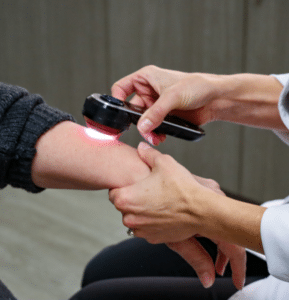Shield Your Skin Against Skin Cancer
 February is National Cancer Prevention Month, a time to raise awareness about the importance of preventing cancer and taking proactive steps toward better health. Skin cancer is one of the most common forms of cancer in the United States, but is often preventable with the right knowledge and lifestyle choices. This month, let’s focus on how you can protect your skin and lower your risk of developing skin cancer.
February is National Cancer Prevention Month, a time to raise awareness about the importance of preventing cancer and taking proactive steps toward better health. Skin cancer is one of the most common forms of cancer in the United States, but is often preventable with the right knowledge and lifestyle choices. This month, let’s focus on how you can protect your skin and lower your risk of developing skin cancer.
Understanding Skin Cancer
Skin cancer occurs when abnormal cells grow uncontrollably in the skin. The three most common types are:
Basal Cell Carcinoma The most common type, typically appearing as a small, shiny bump on sun-exposed skin.
Squamous Cell Carcinoma Often found on the face, ears, neck, chest, and hands, appearing as a red, scaly patch or a firm bump.
Melanoma The deadliest form of skin cancer, which can develop from an existing mole or as a new dark spot on the skin.
While skin cancer is highly treatable when caught early, prevention is the best defense. By being proactive about your skin health, you can significantly reduce your risk.
Sun Protection
One of the leading causes of skin cancer is excessive sun exposure. Ultraviolet (UV) rays from the sun can damage the skin and increase the risk of developing skin cancer. Therefore, sun protection should be part of your daily routine, even on cloudy days or during the winter months. Make sure to apply a broad-spectrum sunscreen with an SPF of 30 or higher to all exposed skin, including your face, neck, ears, and hands. Don’t forget areas like the scalp and the backs of your knees. Sunscreen should be reapplied every two hours, or more frequently if you’re swimming or sweating. In addition to sunscreen, wearing hats with wide brims, sunglasses, and clothing made from UV-protective fabrics can provide additional defense from the sun’s rays. Whenever possible, seek shade, especially during peak sun hours when the sun’s rays are strongest.
Regular Skin Checks and Self-Exams
Regular self-exams and professional skin checks are essential for early detection. Checking your skin regularly helps you spot any new or changing moles, which could be signs of skin cancer. Follow the ABCDEs of melanoma when evaluating your skin:
- Asymmetry: One half of the mole looks different from the other.
- Borders: The edges are irregular or jagged.
- Colors: The mole has multiple colors, such as shades of brown, black, red, or white.
- Diameter: The mole is larger than 6mm (about the size of a pencil eraser).
- Evolving: The mole changes in size, shape, color, or begins to bleed, crust, or itch.
If you notice any of these warning signs, schedule an appointment with your dermatology provider as soon as possible.
Lifestyle Changes
Making certain lifestyle changes can further reduce your risk of skin cancer. While sun protection is crucial, it’s also important to avoid tanning beds, which increase your risk of developing skin cancer—especially melanoma. Additionally, maintaining healthy skin by staying hydrated and using moisturizers can help your skin stay in good condition, reducing the chances of skin damage.
Spreading Awareness
National Cancer Prevention Month is a great time to spread awareness about skin cancer prevention. Share tips with your friends, family, and coworkers, and encourage them to schedule regular skin checks. Teaching children sun safety habits from an early age can also help ensure they grow up with the right knowledge to protect their skin.
Skin cancer is largely preventable with the right knowledge, sun protection, and regular screenings. During National Cancer Prevention Month, take action to protect your skin by adopting healthier habits and staying vigilant about changes in your skin. Remember, prevention and early detection are the best tools in the fight against skin cancer.
Schedule a full-body skin check today and take the first step toward keeping your skin healthy and cancer-free.
